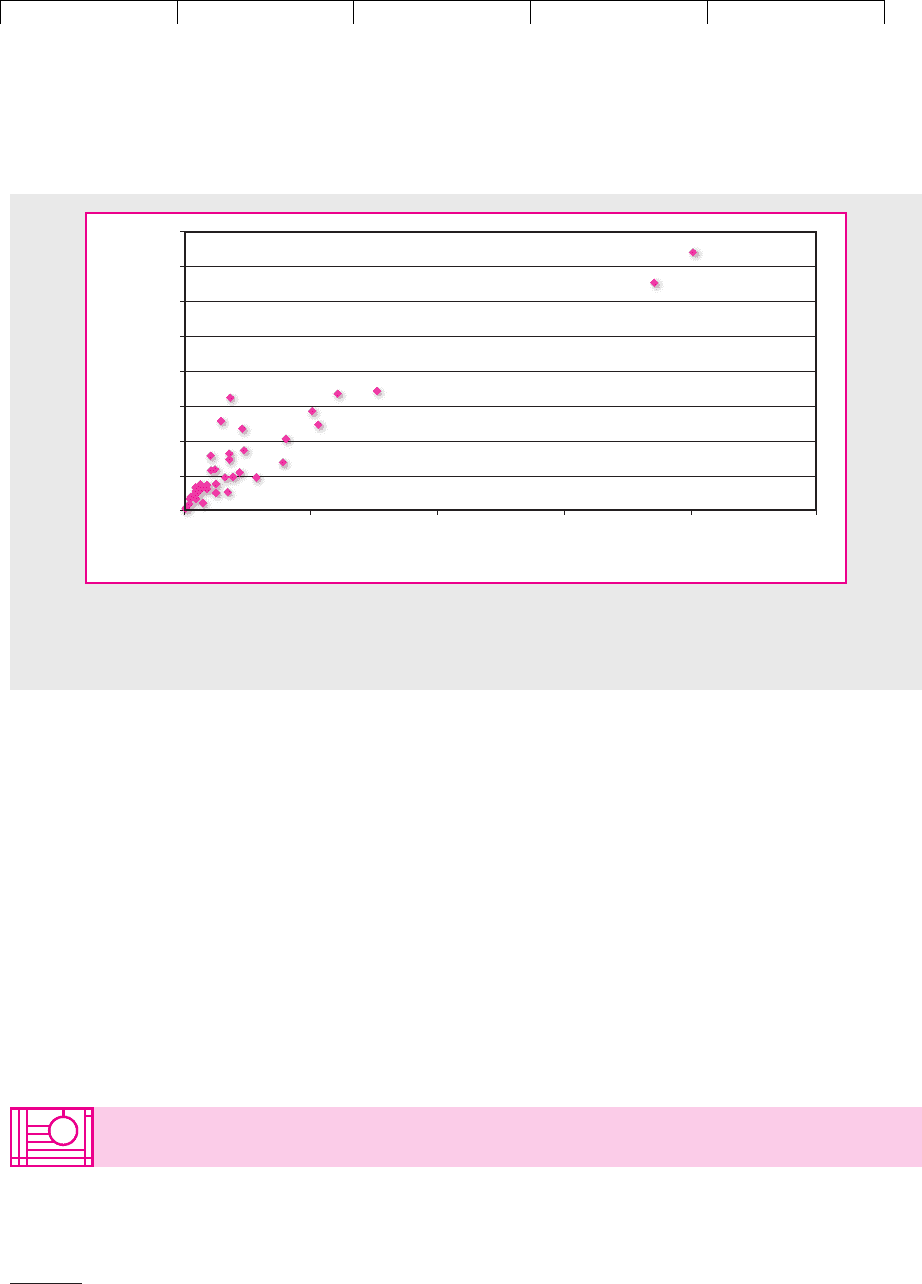Brealey, Myers. Principles of Corporate Finance. 7th edition
Подождите немного. Документ загружается.


Brealey−Meyers:
Principles of Corporate
Finance, Seventh Edition
VIII. Risk Management 28. Managing International
Risks
© The McGraw−Hill
Companies, 2003
have done much better than to assume that changes in the value of the currency
would offset the difference in inflation rates.
4. Equal Real Interest Rates Finally we come to the relationship between interest
rates in different countries. Do we have a single world capital market with the
same real rate of interest in all countries? Does the difference in money interest rates
equal the difference in the expected inflation rates?
This is not an easy question to answer since we cannot observe expected inflation.
However, in Figure 28.4 we have plotted the average interest rate in each of 51 coun-
tries against the inflation that subsequently occurred. Japan is tucked into the bottom-
left corner of the chart, while Turkey is represented by the dot in the top-right corner.
You can see that, in general, the countries with the highest interest rates also had the
highest inflation rates. In other words, there were much smaller differences between
the real rates of interest than between the nominal (or money) rates.
16
CHAPTER 28 Managing International Risks 797
16
In Chapter 24 we saw that in some countries the government has issued indexed bonds promising a fixed
real return. The annual interest payment and the amount repaid at maturity increase with the rate of infla-
tion. In these cases, therefore, we can observe and compare the real rate of interest. As we write this, real
interest rates in Australia, Canada, France, Sweden, and the United States cluster within the range of 3.3 to
3.7 percent. The exception is the UK, where the yield on indexed bonds is under 2.5 percent.
0 20 40
Average inflation rate, percent, 1995–1999
60 80 100
0
10
20
30
40
50
60
70
80
Average money market rate,
percent, 1995–1999
FIGURE 28.4
Countries with the highest interest rates generally have the highest inflation rates. In this diagram, each
of the 51 points represents the experience of a different country.
28.3 HEDGING CURRENCY RISK
Sharp exchange rate movements can make a large dent in corporate profits. To illus-
trate how companies cope with this problem, we will look at a typical company in the
United States, Outland Steel, and walk through its foreign exchange operations.

Brealey−Meyers:
Principles of Corporate
Finance, Seventh Edition
VIII. Risk Management 28. Managing International
Risks
© The McGraw−Hill
Companies, 2003
Example: Outland Steel Outland Steel has a small but profitable export business.
Contracts involve substantial delays in payment, but since the company has a pol-
icy of always invoicing in dollars, it is fully protected against changes in exchange
rates. Recently the export department has become unhappy with this practice and
believes that it is causing the company to lose valuable export orders to firms that
are willing to quote in the customer’s own currency.
You sympathize with these arguments, but you are worried about how the
firm should price long-term export contracts when payment is to be made in for-
eign currency. If the value of that currency declines before payment is made, the
company may suffer a large loss. You want to take the currency risk into ac-
count, but you also want to give the sales force as much freedom of action as
possible.
Notice that Outland can insure against its currency risk by selling the foreign
currency forward. This means that it can separate the problem of negotiating
sales contracts from that of managing the company’s foreign exchange exposure.
The sales force can allow for currency risk by pricing on the basis of the forward
exchange rate. And you, as financial manager, can decide whether the company
ought to hedge.
What is the cost of hedging? You sometimes hear managers say that it is equal
to the difference between the forward rate and today’s spot rate. That is wrong. If
Outland does not hedge, it will receive the spot rate at the time that the customer
pays for the steel. Therefore, the cost of insurance is the difference between the for-
ward rate and the expected spot rate when payment is received.
Insure or speculate? We generally vote for insurance. First, it makes life simpler
for the firm and allows it to concentrate on its main business.
17
Second, it does not
cost much. (In fact, the cost is zero on average if the forward rate equals the ex-
pected spot rate, as the expectations theory of forward rates implies.) Third, the
foreign currency market seems reasonably efficient, at least for the major curren-
cies. Speculation should be a zero-NPV game, unless financial managers have in-
formation that is not available to the pros who make the market.
Is there any other way that Outland can protect itself against exchange loss? Of
course. It can borrow foreign currency against its foreign receivables, sell the cur-
rency spot, and invest the proceeds in the United States. Interest rate parity theory
tells us that in free markets the difference between selling forward and selling spot
should be equal to the difference between the interest that you have to pay over-
seas and the interest that you can earn at home. However, in countries where cap-
ital markets are highly regulated, it may be cheaper to arrange foreign borrowing
rather than forward cover.
18
Our discussion of Outland’s export business illustrates four practical implica-
tions of our simple theories about forward exchange rates. First, you can use for-
ward rates to adjust for exchange risk in contract pricing. Second, the expectations
theory suggests that protection against exchange risk is usually worth having.
Third, interest rate parity theory reminds us that you can hedge either by selling
forward or by borrowing foreign currency and selling spot. Fourth, the cost of for-
798 PART VIII
Risk Management
17
It also relieves shareholders of worrying about the foreign exchange exposure they may have acquired
by purchase of the firm’s shares.
18
Sometimes governments also attempt to prevent currency speculation by limiting the amount that
companies can sell forward.

Brealey−Meyers:
Principles of Corporate
Finance, Seventh Edition
VIII. Risk Management 28. Managing International
Risks
© The McGraw−Hill
Companies, 2003
ward cover is not the difference between the forward rate and today’s spot rate; it
is the difference between the forward rate and the expected spot rate when the for-
ward contract matures.
Perhaps we should add a fifth implication. You don’t make money simply by buy-
ing currencies that go up in value and selling those that go down. For example, sup-
pose that you buy Narnian leos and sell them after a year for 2 percent more than you
paid for them. Should you give yourself a pat on the back? That depends on the inter-
est that you have earned on your leos. If the interest rate on leos is 2 percentage points
less than the interest rate on dollars, the profit on the currency is exactly canceled out
by the reduction in interest income. Thus you make money from currency speculation
only if you can predict whether the exchange rate will change by more or less than the
interest rate differential. In other words, you must be able to predict whether the ex-
change rate will change by more or less than the forward premium or discount.
Transaction Exposure and Economic Exposure
The exchange risk from Outland Steel’s export business is due to delays in foreign
currency payments and is therefore referred to as transaction exposure. Transaction
exposure can be easily identified and hedged. Since a 1 percent fall in the value of
the foreign currency results in a 1 percent fall in Outland’s dollar receipts, for every
euro or yen that Outland is owed by its customers, it needs to sell forward one euro
or one yen.
19
However, Outland may still be affected by currency fluctuations even if its cus-
tomers do not owe it a cent. For example, Outland may be in competition with
Swedish steel producers. If the value of the Swedish krona falls, Outland will need
to cut its prices in order to compete.
20
Outland can protect itself against such an
eventuality by selling the krona forward. In this case the loss on Outland’s steel
business will be offset by the profit on its forward sale.
Notice that Outland’s exposure to the krona is not limited to specific transac-
tions that have already been entered into. Financial managers often refer to this
broader type of exposure as economic exposure.
21
Economic exposure is less easy to
measure than transaction exposure. For example, it is clear that the value of Out-
land Steel is positively related to the value of the krona, so to hedge its position it
needs to sell krona forward. But in practice it may be hard to say exactly how many
krona Outland needs to sell.
Economic exposure is a major source of risk for many firms. When the
deutschemark appreciated in value in 1991 and 1992, German luxury carmakers
such as Porsche and Mercedes took a bath on their overseas sales. So did Ameri-
can dealers that had a franchise to sell these cars. Competitors such as Jaguar,
however, benefited from their rivals’ discomfiture. Thus the German and British
car producers and their dealers were affected by exchange rate changes even
CHAPTER 28
Managing International Risks 799
19
To put it another way, the hedge ratio is 1.0.
20
Of course, if purchasing power parity always held, the fall in the value of the krona would be
matched by higher inflation in Sweden. The risk for Outland is that the real value of the krona may
decline, so that when measured in dollars Swedish costs are lower than previously. Unfortunately,
it is much easier to hedge against a change in the nominal exchange rate than against a change in the
real rate.
21
Financial managers also refer to translation exposure, which measures the effect of an exchange rate
change on the company’s financial statements.

Brealey−Meyers:
Principles of Corporate
Finance, Seventh Edition
VIII. Risk Management 28. Managing International
Risks
© The McGraw−Hill
Companies, 2003
though they may have had no fixed obligation to pay or receive dollars. They had
economic exposure as well as possible transaction exposure.
22
Most firms do not attempt to quantify economic exposure, but that does not
mean that they ignore it. For example, when a company makes a major overseas
investment, it often finances it by foreign currency borrowing. A subsequent fall in
the value of the foreign currency may reduce the dollar value of the investment,
but this is compensated by the fall in the dollar cost of servicing the foreign debt.
Currency Speculation
Outland Steel’s currency exposure arose naturally from its business activity, but the
risk was avoidable; it could have been hedged using either the forward markets or the
loan markets. Sometimes, however, companies deliberately take on currency risk in
the hope of gain. Now there is nothing wrong with that if you truly do have a fore-
casting edge, but we should warn you against the dangers of naive strategies.
Suppose, for example, that a company in the United States notices that the interest
rate on the Swiss franc is lower than on the dollar. Does this mean that it is “cheaper”
to borrow Swiss francs? Before jumping to that conclusion, you need to ask why the
Swiss interest rate is so low. Unless the Swiss government is deliberately holding the
rate down by restrictions on the export of capital, you should suspect that the real cost
of capital is roughly the same in Switzerland as anywhere else. The nominal interest
rate is low only because investors expect a low domestic rate of inflation and a strong
currency. Therefore, the advantage of the low rate of interest is likely to be offset by
the additional dollars required to buy the Swiss francs required to pay off the loan.
You cannot reliably make a profit simply by borrowing in countries with low
nominal rates of interest and you may be taking on considerable currency exposure
by doing so. If the currency subsequently appreciates more rapidly than investors
expect, it could turn out to be very costly to buy the currency that you need to serv-
ice the loan. In 1989 several Australian banks learned this lesson the hard way.
They had induced their clients to borrow at the low Swiss interest rates. When the
value of the Swiss franc rose sharply, the banks found themselves sued by irate
clients for not having warned them of the risk of a rise in the price of Swiss francs.
800 PART VIII
Risk Management
22
The German car producers could have hedged their exposure by borrowing dollars. As the
deutschemark appreciated, their dollar income fell but the cost of servicing dollar loans would also
have fallen. However, while borrowing dollars would have reduced the risk for German car producers,
it should not have affected their decisions about where to produce and sell cars.
28.4 EXCHANGE RISK AND INTERNATIONAL
INVESTMENT DECISIONS
Suppose that the Swiss pharmaceutical company, Roche, is evaluating a proposal
to build a new plant in the United States. To calculate the project’s net present
value, Roche forecasts the following dollar cash flows from the project:
Cash Flows ($ millions)
C
0
C
1
C
2
C
3
C
4
C
5
1,300 400 450 510 575 650

Brealey−Meyers:
Principles of Corporate
Finance, Seventh Edition
VIII. Risk Management 28. Managing International
Risks
© The McGraw−Hill
Companies, 2003
These cash flows are stated in dollars. So to calculate their net present value
Roche discounts them at the dollar cost of capital. (Remember dollars need to be
discounted at a dollar rate, not the Swiss franc rate.) Suppose this cost of capital
is 12 percent. Then
To convert this net present value to Swiss francs, the manager can simply multiply
the dollar NPV by the spot rate of exchange. For example, if the spot rate is 2 SFr/$,
then the NPV in Swiss francs is
Notice one very important feature of this calculation. Roche does not need to
forecast whether the dollar is likely to strengthen or weaken against the Swiss
franc. No currency forecast is needed, because the company can hedge its foreign
exchange exposure. In that case, the decision to accept or reject the pharmaceuti-
cal project in the United States is totally separate from the decision to bet on the
outlook for the dollar. For example, it would be foolish for Roche to accept a poor
project in the United States just because management is optimistic about the out-
look for the dollar; if Roche wishes to speculate in this way it can simply buy dol-
lars forward. Equally, it would be foolish for Roche to reject a good project just
because management is pessimistic about the dollar. The company would do
much better to go ahead with the project and sell dollars forward. In that way, it
would get the best of both worlds.
23
When Roche ignores currency risk and discounts the dollar cash flows at a dol-
lar cost of capital, it is implicitly assuming that the currency risk is hedged. Let us
check this by calculating the number of Swiss francs that Roche would receive if it
hedged the currency risk by selling forward each future dollar cash flow.
We need first to calculate the forward rate of exchange between dollars and
francs. This depends on the interest rates in the United States and Switzerland. For
example, suppose that the dollar interest rate is 6 percent and the Swiss franc in-
terest rate is 4 percent. Then interest rate parity theory tells us that the one-year for-
ward exchange rate is
Similarly, the two-year forward rate is
So, if Roche hedges its cash flows against exchange rate risk, the number of Swiss
francs it will receive in each year is equal to the dollar cash flow times the forward
rate of exchange:
s
SFr/$ˇ
11 r
SFr
2
2
/11 r
$ˇ
2
2
2 1.04
2
1.06
2
1.925
s
SFr/$ˇ
11 r
SFr
2/11 r
$ˇ
2
2 1.04
1.06
1.962
NPV in francs NPV in dollars SFr/$
ˇ 513 2 1,026 million francs
NPV 1,300
400
1.12
450
1.12
2
510
1.12
3
575
1.12
4
650
1.12
5
$ˇ 513 million
CHAPTER 28 Managing International Risks 801
23
There is a general point here that is not confined to currency hedging. Whenever you face an in-
vestment that appears to have a positive NPV, decide what it is that you are betting on and then
think whether there is a more direct way to place the bet. For example, if a copper mine looks prof-
itable only because you are unusually optimistic about the price of copper, then maybe you would
do better to buy copper futures or the shares of other copper producers rather than opening a cop-
per mine.

Brealey−Meyers:
Principles of Corporate
Finance, Seventh Edition
VIII. Risk Management 28. Managing International
Risks
© The McGraw−Hill
Companies, 2003
These cash flows are in Swiss francs and therefore they need to be discounted at
the risk-adjusted Swiss franc discount rate. Since the Swiss rate of interest is lower
than the dollar rate, the risk-adjusted discount rate must also be correspondingly
lower. The formula for converting from the required dollar return to the required
Swiss franc return is
24
In our example
Thus the risk-adjusted discount rate in dollars is 12 percent, but the discount rate
in Swiss francs is only 9.9 percent.
All that remains is to discount the Swiss franc cash flows at the 9.9 percent risk-
adjusted discount rate:
Everything checks. We obtain exactly the same net present value by (a) ignoring cur-
rency risk and discounting Roche’s dollar cash flows at the dollar cost of capital and
(b) calculating the cash flows in francs on the assumption that Roche hedges the cur-
rency risk and then discounting these Swiss franc cash flows at the franc cost of capital.
To repeat: When deciding whether to invest overseas, separate out the invest-
ment decision from the decision to take on currency risk. This means that your
views about future exchange rates should NOT enter into the investment decision.
The simplest way to calculate the NPV of an overseas investment is to forecast the
cash flows in the foreign currency and discount them at the foreign currency cost
of capital. The alternative is to calculate the cash flows that you would receive if
you hedged the foreign currency risk. In this case you need to translate the foreign
currency cash flows into your own currency using the forward exchange rate and then
discount these domestic currency cash flows at the domestic cost of capital. If the
two methods don’t give the same answer, you have made a mistake.
When Roche analyzes the proposal to build a plant in the United States, it is able
to ignore the outlook for the dollar only because it is free to hedge the currency risk. Be-
1,026 million francs
NPV 2,600
785
1.099
866
1.099
2
963
1.099
3
1,066
1.099
4
1,182
1.099
5
11 Swiss franc return2 1.12
1.04
1.06
1.099
11 Swiss franc return2 11 dollar return2
11 Swiss franc interest rate2
11 dollar interest rate2
802 PART VIII
Risk Management
Cash Flows (millions of Swiss francs)
C
0
C
1
C
2
C
3
C
4
C
5
1,300 2 400 1.962 450 1.925 510 1.889 575 1.853 650 1.818
2,600 785 866 963 1,066 1,182
24
The following example should give you a feel for the idea behind this formula. Suppose the spot rate
for Swiss francs is . Interest rate parity tells us that the forward rate must be
SFr/$. Now suppose that a share costs $100 and will pay an expected $112 at
the end of the year. The cost to Swiss investors of buying the share is SFr. If the Swiss in-
vestors sell forward the expected payoff, they will receive an expected SFr. The
expected return in Swiss francs is or 9.9 percent. More simply, the Swiss franc re-
turn is .1.12 1.04/1.06 1 .099
219.8/200 1 .099
112 1.9623 219.8
100 2 200
2 1.04/1.06 1.9623
2 SFr $ˇ 1

Brealey−Meyers:
Principles of Corporate
Finance, Seventh Edition
VIII. Risk Management 28. Managing International
Risks
© The McGraw−Hill
Companies, 2003
cause investment in a pharmaceutical plant does not come packaged with an in-
vestment in the dollar, the opportunity for firms to hedge allows for better invest-
ment decisions.
More about the Cost of Capital
In our discussion of Roche’s investment decision we did not explain how Roche es-
timated the cost of capital for its investment in the United States. There is no sim-
ple agreed-upon procedure for doing this but we suggest that you first estimate the
cost of capital in Swiss francs and then convert it to a dollar cost.
We discussed the problem of estimating the required return on Roche’s overseas
investment in Chapter 9. You need to decide how risky an investment in the U.S.
pharmaceutical business would be to a Swiss investor. For example, a good start-
ing point might be to look at the betas of a sample of U.S. pharmaceutical compa-
nies relative to the Swiss market index.
25
Suppose that you decide that the investment’s beta relative to the Swiss market
is .7 and that the market risk premium in Switzerland is 8.4 percent. Then the re-
quired return on the project can be estimated as
This is the project’s cost of capital measured in Swiss francs. We used it above to
discount the expected Swiss franc cash flows if Roche hedged the project against
currency risk. We cannot use it to discount the dollar cash flows from the project.
To discount the expected dollar cash flows, we need to convert the Swiss franc
cost of capital to a dollar cost of capital. This means running our earlier calculation
in reverse:
In our example,
We used this 12 percent dollar cost of capital to discount the forecasted dollar cash
flows from the project.
11 dollar return2 1.099
1.06
1.04
1.12
11 dollar return2 11 Swiss franc return2
11 dollar interest rate2
11 Swiss franc interest rate2
4 1.7 8.42 9.9%
Required return Swiss interest rate 1beta Swiss market risk premium2
CHAPTER 28
Managing International Risks 803
25
We pointed out in Chapter 9 that when we use the beta relative to the U.S. index to estimate the re-
turns required by U.S. investors, we are assuming that the U.S. market index is an efficient portfolio for
these investors. Similarly, when we use the beta relative to the Swiss index to estimate the returns that
Swiss investors require, we are assuming that the Swiss market index is an efficient portfolio for these
investors. Investors do invest largely, but not exclusively, in their home markets.
28.5 POLITICAL RISK
So far we have focused on the management of exchange rate risk, but managers
also worry about political risk. By this they mean the threat that a government will
change the rules of the game—that is, break a promise or understanding—after the

Brealey−Meyers:
Principles of Corporate
Finance, Seventh Edition
VIII. Risk Management 28. Managing International
Risks
© The McGraw−Hill
Companies, 2003
investment is made. Of course political risks are not confined to overseas invest-
ments. Businesses in every country are exposed to the risk of unanticipated actions
by governments or the courts. But in some parts of the world foreign companies
are particularly vulnerable.
A number of consultancy services offer analyses of political and economic risks
and draw up country rankings.
26
For example, Table 28.3 is an extract from the
1999 political risk rankings provided by the PRS Group. You can see that each
country is scored on 12 separate dimensions. The Netherlands comes top of the
class overall, while Iraq is near the bottom.
Some managers dismiss political risk as an act of God, like a hurricane or earth-
quake. But the most successful multinational companies structure their business to
reduce political risk. Foreign governments are not likely to expropriate a local busi-
ness if it cannot operate without the support of its parent. For example, the foreign
subsidiaries of American computer manufacturers or pharmaceutical companies
would have relatively little value if they were cut off from the know-how of their
parents. Such operations are much less likely to be expropriated than, say, a min-
ing operation that can be operated as a stand-alone venture.
We are not recommending that you turn your silver mine into a pharmaceutical
company, but you may be able to plan your overseas manufacturing operations to
804 PART VIII
Risk Management
26
For a discussion of these services see C. Erb, C. R. Harvey, and T. Viskanta, “Political Risk, Financial
Risk, and Economic Risk,” Financial Analysts Journal 52 (1996), pp. 28–46. Campbell Harvey’s web page
(www.duke.edu/~charvey) is also a useful source of information on political risk.
A B C D E F G H I J K L Total
Maximum score 12 12 12 12 12 6 6 6 6 6 6 4 100
Netherlands 9 10 10 12 12 6 6 6 6 6 6 4 93
USA 11 10 11 11 8 4 6 6 6 5 6 4 88
Germany 10 8 9 12 11 5 6 6 6 5 5 4 87
United Kingdom 11 10 11 9 9 5 6 6 6 4 6 4 87
France 10 7 9 10 11 3 5 6 5 5 5 4 80
Japan 10 6 6 12 10 2 6 5 6 6 5 4 78
Brazil 9 4 5 9 11 3 4 6 2 4 4 2 63
China 11 4 6 10 9 2 2 5 5 4 1 2 61
India 5 5 5 8 5 3 5 2 4 2 5 3 52
Russia 7 2 3 8 10 1 4 5 3 3 2 1 49
Indonesia 10 3 5 4 9 1 1 2 2 2 2 3 44
Iraq 8 3 4 3 4 1 0 5 2 2 0 0 32
TABLE 28.3
Political risk scores for a sample of countries, 1999.
Key:
A Government stability G Military in politics
B Socioeconomic conditions H Religious tensions
C Investment profile I Law and order
D Internal conflict J Ethnic tensions
E External conflict K Democratic accountability
F Corruption L Bureaucracy quality
Source: PRS Group (www.prsgroup.com
).

Brealey−Meyers:
Principles of Corporate
Finance, Seventh Edition
VIII. Risk Management 28. Managing International
Risks
© The McGraw−Hill
Companies, 2003
improve your bargaining position with foreign governments. For example, Ford
has integrated its overseas operations so that the manufacture of components, sub-
assemblies, and complete automobiles is spread across plants in a number of coun-
tries. None of these plants would have much value on its own, and Ford can switch
production between plants if the political climate in one country deteriorates.
Multinational corporations have also devised financing arrangements to help
keep foreign governments honest. For example, suppose your firm is contemplat-
ing an investment of $500 million to reopen the San Tomé silver mine in Costaguana
with modern machinery, smelting equipment, and shipping facilities.
27
The
Costaguanan government agrees to invest in roads and other infrastructure and to
take 20 percent of the silver produced by the mine in lieu of taxes. The agreement is
to run for 25 years.
The project’s NPV on these assumptions is quite attractive. But what happens if
a new government comes into power five years from now and imposes a 50 per-
cent tax on “any precious metals exported from the Republic of Costaguana”? Or
changes the government’s share of output from 20 to 50 percent? Or simply takes
over the mine “with fair compensation to be determined in due course by the Min-
ister of Natural Resources of the Republic of Costaguana”?
No contract can absolutely restrain sovereign power. But you can arrange proj-
ect financing to make these acts as painful as possible for the foreign government.
For example, you might set up the mine as a subsidiary corporation, which then
borrows a large fraction of the required investment from a consortium of major in-
ternational banks. If your firm guarantees the loan, make sure the guarantee stands
only if the Costaguanan government honors its contract. The government will be
reluctant to break the contract if that causes a default on the loans and undercuts
the country’s credit standing with the international banking system.
If possible, you should arrange for the World Bank (or one of its affiliates) to fi-
nance part of the project or to guarantee your loans against political risk.
28
Few
governments have the guts to take on the World Bank. Here is another variation on
the same theme. Arrange to borrow, say, $450 million through the Costaguanan De-
velopment Agency. In other words, the development agency borrows in interna-
tional capital markets and relends to the San Tomé mine. Your firm agrees to stand
behind the loan as long as the government keeps its promises. If it does keep them,
the loan is your liability. If not, the loan is its liability.
Political risk is not confined to the risk of expropriation. Multinational compa-
nies are always exposed to the criticism that they siphon funds out of countries in
which they do business, and, therefore, governments are tempted to limit their
freedom to repatriate profits. This is most likely to happen when there is consider-
able uncertainty about the rate of exchange, which is usually when you would
most like to get your money out. Here again a little forethought can help. For ex-
ample, there are often more onerous restrictions on the payment of dividends to
the parent than on the payment of interest or principal on debt. Royalty payments
and management fees are less sensitive than dividends, particularly if they are
levied equally on all foreign operations. A company can also, within limits, alter
the price of goods that are bought or sold within the group, and it can require more
or less prompt payment for such goods.
CHAPTER 28
Managing International Risks 805
27
The early history of the San Tomé mine is described in Joseph Conrad’s Nostromo.
28
In Section 25.7 we described how the World Bank provided the Hubco power project with a guaran-
tee against political risk.

Brealey−Meyers:
Principles of Corporate
Finance, Seventh Edition
VIII. Risk Management 28. Managing International
Risks
© The McGraw−Hill
Companies, 2003
The international financial manager has to cope with different currencies, interest
rates, and inflation rates. To produce order out of chaos, the manager needs some
model of how they are related. We described four very simple but useful theories.
Interest rate parity theory states that the interest differential between two coun-
tries must be equal to the difference between the forward and spot exchange rates.
In the international markets, arbitrage ensures that parity almost always holds.
There are two ways to hedge against exchange risk: One is to take out forward
cover; the other is to borrow or lend abroad. Interest rate parity tells us that the
costs of the two methods should be the same.
The expectations theory of exchange rates tells us that the forward rate equals
the expected spot rate. In practice forward rates seem to incorporate a risk pre-
mium, but this premium is about equally likely to be negative as positive.
In its strict form, purchasing power parity states that $1 must have the same pur-
chasing power in every country. That doesn’t square well with the facts, for differ-
ences in inflation rates are not perfectly related to changes in exchange rates. This
means that there may be some genuine exchange risks in doing business overseas.
On the other hand, the difference in inflation rates is just as likely to be above as
below the change in the exchange rate.
Finally, we saw that in an integrated world capital market real rates of interest
would have to be the same. In practice government regulation and taxes can cause
differences in real interest rates. But do not simply borrow where interest rates are
lowest. Those countries are also likely to have the lowest inflation rates and the
strongest currencies.
With these precepts in mind we showed how you can use forward markets or
the loan markets to hedge transactions exposure, which arises from delays in for-
eign currency payments and receipts. But the company’s financing choices also
need to reflect the impact of a change in the exchange rate on the value of the en-
tire business. This is known as economic exposure.
Because companies can hedge their currency risk, the decision to invest overseas
does not involve currency forecasts. There are two ways for a company to calculate
the NPV of an overseas project. The first is to forecast the foreign currency cash flows
and to discount them at the foreign currency cost of capital. The second is to trans-
late the foreign currency cash flows into domestic currency assuming that they are
hedged against exchange rate risk. These domestic currency flows can then be dis-
counted at the domestic cost of capital. The answers should be identical.
In addition to currency risk, overseas operations may be exposed to extra polit-
ical risk. However, firms may be able to structure the financing to reduce the
chances that government will change the rules of the game.
FURTHER
READING
There are a number of useful textbooks in international finance. Here is a small selection:
D. K. Eiteman and A. I. Stonehill: Multinational Business Finance, 8th ed., Addison-Wesley
Publishing Company, Inc., Reading, MA, 1998.
J. O. Grabbe, International Financial Markets, 3rd ed., Prentice-Hall, Inc., Englewood Cliffs,
NJ, 1995.
P. Sercu and R. Uppal: International Financial Markets and the Firm, South-Western College
Publishing, Cincinnati, OH, 1995.
SUMMARY
Visit us at www.mhhe.com/bm7e
